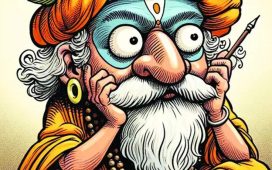The takhallus also provides vajan (weight) and stability to the writer as a form of branding. In the time before social media, this is how you advertised your wares. It was also the image you wished to be embedded in your readers’ minds when they thought about you, like Chaplin’s recurved cane and oversized boots.
So, Harivansh Rai was always the popular boy next door. Women apparently attended his readings with roses clutched between their lips. Ramdhari Singh always toned you up like the rising sun with his veer ras. ‘Jab naash manuj par chata hai, pehle vivek mar jata hai – the ever-popular verse of choice in Patna schools, especially when you have a classmate named Kumar Vivek.
But sometimes it does not work. Like Bahadur Shah and his dreams of victory. Then it’s a way of dissembling to throw the reader off scent. There is nothing obscure about Sudama Panday’s poetry – nothing is dhoomil.
In the world of North Indian non-English letters, a takhallus – Arabic for ‘to get liberated or become secure’ – is what separates the men from the boys. It is also what separates the women from the men. No takhallus for Mahadevi Varma, Ismat Chughtai, Subhadra Kumari Chauhan, Qurratulain Hyder, Mridula Garg….
Why? Are women writers a bit more secure than their (North Indian) male counterparts? They certainly don’t appear to need the additional weight of a takhallus. There is no faffing around. In any case, with marriage most of them get issued a new set of names.
Maybe that’s also why there are so few collectors among women except for things like diamonds and real estate. Very few India Post first-day cover collectors, or Hind Pocket Books first edition aficionados among this lot. With all these thoughts swirling in my mind, I went to my wife and demanded a suitable takhallus for myself.
‘So you’re finally ashamed of what you do and want to disappear behind a false name like John le Carre?’
‘No, no, that’s a nom de plume. That won’t do. I am perfectly happy with my name. I just need something extra to buff my halo with.’
‘So what you need is a name with purpose. Something combative. A nom de guerre?’
‘Like Pol Pot?’
‘More like Fuss Pot.’ And here she laughed.
This wasn’t going too well. So, once again, I explained to her patiently my professional intent. I just wanted to update my CV and appear connected to my changed country, like a true son of the soil.
‘I just want a takhallus, dear girl. Like Sahir, like Firaq. Is that so bloody hard?’
‘No writer born after 1970 has a takhallus anymore. It’s no longer in fashion.’
‘I want to go retro. Call me old school. Just get to work.’
‘All right,’ she said and looked at me intently. I waited, with bated breath.
Then after a few minutes she snapped her fingers and said, ‘Sannata.’
I liked that. Sannata. Quietude. It definitely had vajan to it. It made me seem mysterious and accomplished. Bless her. I proceeded to ask my vidushi wife ‘Is it because of the quiet lyricism of my prose?’
‘No, dear boy, it is because of that.’ And she pointed to my rapidly receding hairline.










